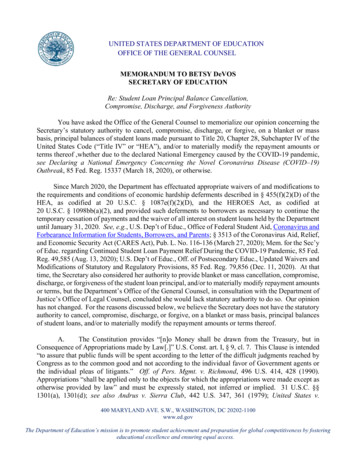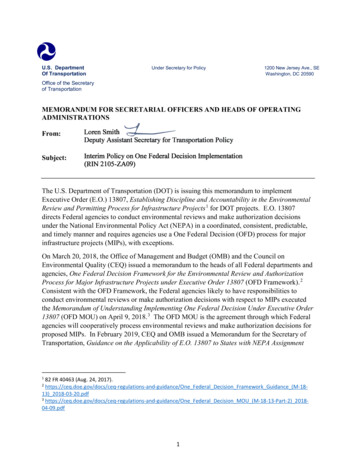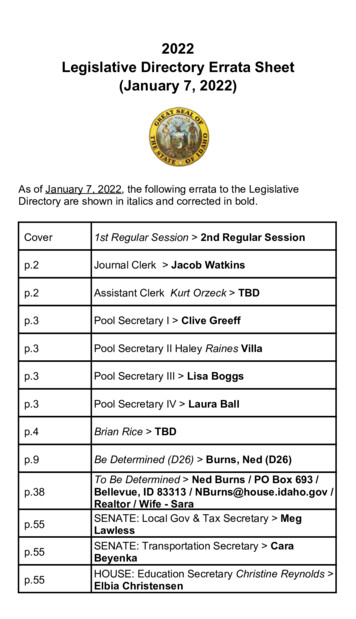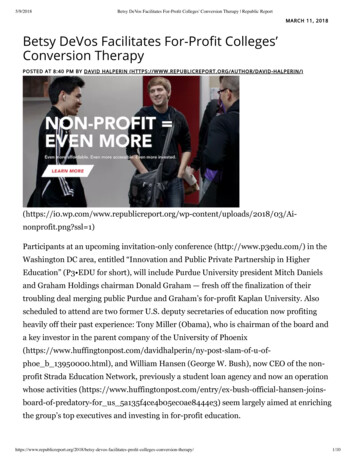
Transcription
UNITED STATES DEPARTMENT OF EDUCATIONOFFICE OF THE GENERAL COUNSELMEMORANDUM TO BETSY DeVOSSECRETARY OF EDUCATIONRe: Student Loan Principal Balance Cancellation,Compromise, Discharge, and Forgiveness AuthorityYou have asked the Office of the General Counsel to memorialize our opinion concerning theSecretary’s statutory authority to cancel, compromise, discharge, or forgive, on a blanket or massbasis, principal balances of student loans made pursuant to Title 20, Chapter 28, Subchapter IV of theUnited States Code (“Title IV” or “HEA”), and/or to materially modify the repayment amounts orterms thereof ,whether due to the declared National Emergency caused by the COVID-19 pandemic,see Declaring a National Emergency Concerning the Novel Coronavirus Disease (COVID–19)Outbreak, 85 Fed. Reg. 15337 (March 18, 2020), or otherwise.Since March 2020, the Department has effectuated appropriate waivers of and modifications tothe requirements and conditions of economic hardship deferments described in § 455(f)(2)(D) of theHEA, as codified at 20 U.S.C. § 1087e(f)(2)(D), and the HEROES Act, as codified at20 U.S.C. § 1098bb(a)(2), and provided such deferments to borrowers as necessary to continue thetemporary cessation of payments and the waiver of all interest on student loans held by the Departmentuntil January 31, 2020. See, e.g., U.S. Dep’t of Educ., Office of Federal Student Aid, Coronavirus andForbearance Information for Students, Borrowers, and Parents; § 3513 of the Coronavirus Aid, Relief,and Economic Security Act (CARES Act), Pub. L. No. 116-136 (March 27, 2020); Mem. for the Sec’yof Educ. regarding Continued Student Loan Payment Relief During the COVID-19 Pandemic, 85 Fed.Reg. 49,585 (Aug. 13, 2020); U.S. Dep’t of Educ., Off. of Postsecondary Educ., Updated Waivers andModifications of Statutory and Regulatory Provisions, 85 Fed. Reg. 79,856 (Dec. 11, 2020). At thattime, the Secretary also considered her authority to provide blanket or mass cancellation, compromise,discharge, or forgiveness of the student loan principal, and/or to materially modify repayment amountsor terms, but the Department’s Office of the General Counsel, in consultation with the Department ofJustice’s Office of Legal Counsel, concluded she would lack statutory authority to do so. Our opinionhas not changed. For the reasons discussed below, we believe the Secretary does not have the statutoryauthority to cancel, compromise, discharge, or forgive, on a blanket or mass basis, principal balancesof student loans, and/or to materially modify the repayment amounts or terms thereof.A.The Constitution provides “[n]o Money shall be drawn from the Treasury, but inConsequence of Appropriations made by Law[.]” U.S. Const. art. I, § 9, cl. 7. This Clause is intended“to assure that public funds will be spent according to the letter of the difficult judgments reached byCongress as to the common good and not according to the individual favor of Government agents orthe individual pleas of litigants.” Off. of Pers. Mgmt. v. Richmond, 496 U.S. 414, 428 (1990).Appropriations “shall be applied only to the objects for which the appropriations were made except asotherwise provided by law” and must be expressly stated, not inferred or implied. 31 U.S.C. §§1301(a), 1301(d); see also Andrus v. Sierra Club, 442 U.S. 347, 361 (1979); United States v.400 MARYLAND AVE. S.W., WASHINGTON, DC 20202-1100www.ed.govThe Department of Education’s mission is to promote student achievement and preparation for global competitiveness by fosteringeducational excellence and ensuring equal access.
MacCollom, 426 U.S. 317, 321 (1976); U.S. Gov’t Accountability Off., Principles of Fed.Appropriations Law, Chapter 1, at p. 1–6 (4th ed. 2016). The Antideficiency Act, codified at 31 U.S.C.§§ 1341-1342, 1349-1351, 1511-1519 (“ADA”), is one of several means by which Congress enforcesits Constitutional authority. Also, the Federal Claims Collection Act, 31 U.S.C. § 3711, et seq.,obligates agencies to “try to collect a claim of the United States Government for money . . . arisingout of the activities of, or referred to, the agency[.]” 31 U.S.C. § 3711(a)(1). By controlling regulation,the Secretary is directed to “aggressively collect all debts” and delegated limited compromise andsettlement authority. See 31 CFR 901.1(a); see also 31 U.S.C. § 3711(a)(2); 31 CFR 902.2, 902.3,902.4. Among other things, we must be mindful of the fact that the Executive Branch does not havethe dispensing power on its own. Richmond, 496 U.S. at 435 (White, J. and Blackmun, J., concurring)(citing Kendall v. United States ex rel. Stokes, 12 Pet. 524, 613, 9 L.Ed. 1181 (1838)); Angelus MillingCo. v. Commissioner, 325 U.S. 293, 296 (1945).B.The nature and scope of the Secretary’s HEA authority is determined by construing therelevant statutory text in accordance with its ordinary public meaning at the time of enactment, Bostockv. Clayton Cnty., 140 S. Ct. 1731, 1738 (2020), in context and with consideration for the overallstatutory scheme. Yates v. United States, 574 U.S. 528, 537–38, 40–41 (2015) (Ginsberg, J.); Davisv. Mich. Dep’t. of Treasury, 489 U.S. 803, 809 (1989). The statute must be construed “as asymmetrical and coherent regulatory scheme,” and we are obligated to “fit, if possible, all parts intoan harmonious whole[.]” FDA v. Brown & Williamson Tobacco Corp., 529 U.S. 120, 133 (2000)(citations and quotation marks omitted). Consequently, “every word and every provision is to be giveneffect. . . .None should needlessly be given an interpretation that causes it to duplicate anotherprovision or to have no consequence.” Antonin Scalia & Bryan A. Garner, READING LAW: THEINTERPRETATION OF LEGAL TEXTS 174 (2012); Circuit City Stores, Inc. v. Adams, 532 U.S. 105 (2001);United States v. Alaska, 521 U.S. 1 (1997); Walters v. Metro. Educ. Enters., Inc., 519 U.S. 202 (1997);Rake v. Wade, 508 U.S. 464 (1993); Kungys v. United States, 485 U.S. 759, 778 (1988) (pluralityopinion by Scalia, J.) (citing the “cardinal rule of statutory interpretation that no provision should beconstrued to be entirely redundant”).Also, we are obligated to recognize and give effect to the principle Congress “does not . . . hideelephants in mouseholes.” Gonzales v. Oregon, 546 U.S. 243, 267 (2006); see also Whitman v. Am.Trucking Ass’ns, Inc., 531 US 457, 468 (2001); Brown & Williamson, 529 U.S. at 160. That is,Congress does not impliedly delegate a policy decision of massive economic and political magnitude– as blanket or mass cancellation, compromise, discharge, or forgiveness of student loan principalbalances, or the material modification of the repayment terms or amounts thereof, surely would be –to an administrative agency. See Whitman, 531 U.S. at 468.Finally, if an otherwise acceptable construction of a statute raises serious constitutionalproblems, and where an alternative interpretation of the statute is “fairly possible,” Crowell v. Benson,285 U.S. 22, 62 (1932), then the statute should be construed to avoid such problems. Ashwander v.Tenn. Valley Auth., 297 U.S. 288, 341, 345–348 (1936) (Brandeis, J., concurring); see U.S. ex rel.Att’y Gen. v. Del. & Hudson Co., 213 U.S. 366, 408 (1909); see also Nielsen v. Preap, 139 S. Ct. 954,971 (2019).2 of 8
C.All federal student loan programs administered by the Department are funded throughannual Congressional appropriations drawn from the Treasury. These appropriations are conditionedon the Department’s faithful execution of the laws authorizing that loans be made available to eligibleborrowers and then repaid or collected. See 20 U.S.C. §§ 1077a, 1078, 1078-3, 1078-6, 1078-7, 1080,1080a, 1082, 1083, 1085, 1087e, 1087-1, 1087gg, 1091b, 1092b, 1092c, 1095a, 1098e. AlthoughCongress could enact legislation authorizing the Department to provide blanket or mass cancellation,compromise, discharge, or forgiveness of student loan principal balances, and/or to materially modifyrepayment amounts or terms, it has not done so. See 20 U.S.C. §§ 1077-10 – 1077-12, 1087e(f),1087e(h), 1087ee, 1091b, 1098d. Rather, Congress has explicitly authorized cancellation,compromise, discharge, or forgiveness, and/or material modifications to repayment amounts or termsonly in very limited circumstances. See, e.g., 20 U.S.C. §§ 1087e(f), 1087e(h), 1094(b)(3), 1098aa, etseq.At the same time, Congress has delegated to the Secretary of Education certain general powersregarding the Family Federal Education Loan program under Part B of Title IV (“FFEL”), includingthe ability to “enforce, pay, compromise, waive, or release any right, title, claim, lien, or demand,however acquired, including any equity or any right of redemption.” 20 U.S.C. § 1082(a)(6). TheSecretary’s general powers in 20 U.S.C. § 1082(a)(6) also apply to the William D. Ford Federal DirectLoan Program under Part D of Title IV. 20 U.S.C. § 1087a(b)(2).This raises an obvious interpretative question – whether the general grant of authority under20 U.S.C. § 1082(a)(6) to “compromise, waive, or release any right, title, claim, lien, or demand”empowers the Secretary, on a blanket or mass basis, to cancel, compromise, discharge, or forgivestudent loan principal balances and/or to materially modify the repayment amounts or terms thereof,notwithstanding other, more specific Title IV provisions requiring repayment and providing forcancellation, compromise, discharge, forgiveness, or modification only in limited circumstances. Webelieve reading 20 U.S.C. § 1082(a)(6) to permit the Secretary, on a blanket or mass basis, to cancel,compromise, discharge, or forgive student loan principal balances, or to materially modify therepayment amounts or terms thereof, would “be hyperliteral and contrary to common sense.” RadLAXGateway Hotel, LLC v. Amalgamated Bank, 566 U.S. 639, 645 (2012). Title IV’s plain text andstatutory scheme, and controlling interpretative canons, compel us to conclude Congress appropriatedfunds for student loans with the expectation that such loans would be repaid except in very specificcircumstances.“[I]t is a commonplace of statutory construction that the specific governs the general.”Morales v. Trans World Airlines, Inc., 504 U.S. 374, 384 (1992). That is particularly true where, ashere, “Congress has enacted a comprehensive scheme and has deliberately targeted specific problemswith specific solutions.” Varity Corp. v. Howe, 516 U.S. 489, 519 (1996) (Thomas, J., dissenting); seealso HCSC–Laundry v. United States, 450 U.S. 1, 6 (1981) (per curiam) (the specific governs thegeneral “particularly when the two are interrelated and closely positioned, both in fact being parts of[the same statutory scheme]”). As Justice Scalia, writing for a unanimous Court, pointed out:The general/specific canon is perhaps most frequently applied to statutes in which ageneral permission or prohibition is contradicted by a specific prohibition orpermission. To eliminate the contradiction, the specific provision is construed as an3 of 8
exception to the general one. But the canon has full application as well to statutes suchas the one here, in which a general authorization and a more limited, specificauthorization exist side-by-side. There the canon avoids not contradiction but thesuperfluity of a specific provision that is swallowed by the general one, violat[ing] thecardinal rule that, if possible, effect shall be given to every clause and part of a statute.Gateway Hotel, 566 U.S. at 645(citations and quotation marks omitted) (emphasis added).Assuming arguendo that there is a policy case for student loan principal balance cancellation,compromise, discharge, or forgiveness by administrative decree, 1 the Office of the General Counseldoes not believe the statutory scheme fairly allows 20 U.S.C. § 1082(a)(6) to be the basis for doingso. Rather, we believe 20 U.S.C. § 1082(a)(6) is best construed as a limited authorization for theSecretary to provide cancellation, compromise, discharge, or forgiveness only on a case-by-case basis 2and then only under those circumstances specified by Congress. 3 Attempting to shoehorn broadauthority into 20 U.S.C. § 1082(a)(6) would create a paradigmatic “elephant in a mousehole,” swallowup and render surplusage many Title IV provisions, and needlessly create Spending Clause,Antideficiency Act, and dispensing power concerns. Whitman, 531 U.S. at 468; see also Nielsen, 139S. Ct. at 969; Gateway Hotel, 566 U.S. at 645; Yates, 574 U.S. at 540–41; Brown & Williamson, 521U.S. at 133; Richmond, 496 U.S. at 435; Benson, 285 U.S. at 62.1We note evidence suggesting blanket or mass loan forgiveness, especially by administrative fiat,would be a significantly regressive policy with significant moral hazard. See, e.g., Catherine &Yannelis, The Distributional Effects of Student Loan Forgiveness: University of Chicago, BeckerFriedman Institute for Economics Working Paper No. 2020-169 (Dec. 10, 2020).2Consequently, we believe the “class action” provision of the 2016 borrower defense rule, 34 C.F.R.§§ 685.222(f)–(h), providing for blanket or mass cancellation, compromise, discharge, or forgivenessof student loan principal balances based on substantial misrepresentations, is problematic at best.Neither Title IV nor the Administrative Procedure Act specifically authorizes such a provision.3The Department has recognized the far outer boundary of its authority as authorizing partialcompromise or waiver of FFEL program loans held by the Department, and only to the extent ofproviding an interest credit for a defined time period, such as during the time when a borrower defenseapplication regarding such loan(s) is pending or during the weeks between the declaration of theCOVID-19 national emergency and the passage of the CARES Act. The Department has alsointerpreted this general power to apply in a similar way in the context of the Direct loan program andthe Perkins loan program, based on statutory language extending “the same terms, conditions, andbenefits” for those loans as are available for FFEL program loans. 20 U.S.C. § 1087e(a)(1) (“Unlessotherwise specified in this part, loans made to borrowers under this part shall have the same terms,conditions, and benefits, and be available in the same amounts, as loans made to borrowers, and firstdisbursed on June 30, 2010, under sections 1078, 1078-2, 1078-3, and 1078-8 of this title.”); 20 U.S.C.§ 1087dd. Yet even this conclusion is debatable because the Secretary’s general power to compromiseor waive claims under the FFEL program is neither a term nor a condition nor a benefit of FFELprogram loans.4 of 8
D.Congress has delegated to the Secretary authority to provide specified waivers ormodifications to Title IV federal financial student aid program statutory and regulatory requirementsbecause of the declared National Emergency. See Declaring a National Emergency Concerning theNovel Coronavirus Disease (COVID–19) Outbreak, 85 Fed. Reg. 15,337 (March 18, 2020). TheHEROES Act of 2003, codified at 20 U.S.C. § 1098aa, et seq., provides:Notwithstanding any other provision of law, unless enacted with specific reference tothis section, the Secretary of Education . . . may waive or modify any statutory orregulatory provision applicable to the student financial assistance programs under titleIV of the Act [, 20 U.S.C. §1070, et seq.,] as the Secretary deems necessary inconnection with a war or other military operation or national emergency to provide thewaivers or modifications authorized by paragraph (2).20 U.S.C. § 1098bb(a)(1). However, Congress narrowly cabined the scope of the Secretary’sdiscretion. Specifically, 20 U.S.C. § 1098bb(a)(2) provides:(2)Actions authorized. The Secretary is authorized to waive or modify anyprovision described in paragraph (1) as may be necessary to ensure that—(A) recipients of student financial assistance under title IV of the Act who areaffected individuals are not placed in a worse position financially in relation tothat financial assistance because of their status as affected individuals;(B) administrative requirements placed on affected individuals who arerecipients of student financial assistance are minimized, to the extent possiblewithout impairing the integrity of the student financial assistance programs, toease the burden on such students and avoid inadvertent, technical violations ordefaults;(C) the calculation of “annual adjusted family income” and “available income”,as used in the determination of need for student financial assistance under titleIV of the Act for any such affected individual (and the determination of suchneed for his or her spouse and dependents, if applicable), may be modified tomean the sums received in the first calendar year of the award year for whichsuch determination is made, in order to reflect more accurately the financialcondition of such affected individual and his or her family;(D) the calculation under section 484B(b)(2) of the Act (20 U.S.C. 1091b(b)(2))of the amount a student is required to return in the case of an affected individualmay be modified so that no overpayment will be required to be returned orrepaid if the institution has documented (i) the student’s status as an affectedindividual in the student’s file, and (ii) the amount of any overpaymentdischarged; and5 of 8
(E) institutions of higher education, eligible lenders, guaranty agencies, andother entities participating in the student assistance programs under title IV ofthe Act that are located in areas that are declared disaster areas by any Federal,State or local official in connection with a national emergency, or whoseoperations are significantly affected by such a disaster, may be grantedtemporary relief from requirements that are rendered infeasible or unreasonableby a national emergency, including due diligence requirements and reportingdeadlines.20 U.S.C. § 1098bb(a)(2).Plain HEA language and context strongly suggest Congress never intended the HEROES Actas authority for mass cancellation, compromise, discharge, or forgiveness of student loan principalbalances, and/or to materially modify repayment amounts or terms for at least three reasons. First, theSecretary’s delegated authority is limited (a) to the waiver or modification of statutory requirementsto put individual borrowers who are “affected individuals,” defined as a person who “resides or isemployed in an area that is declared a disaster area by any Federal, State, or local official in connectionwith a national emergency; or suffered direct economic hardship as a direct result of a war or othermilitary operation or national emergency, as determined by the Secretary”, 20 U.S.C. § 1098ee(2), inthe same position financially in relation to their Title IV loans as if the national emergency had notoccurred; and (b) to minimize administrative requirements to “avoid inadvertent, technical violationsor defaults,” among other things. 20 U.S.C. § 1098bb(a)(2)(A), (B). Second, the reference to“defaults” in § 1098bb(a)(2)(B), and the cross-cite to § 1091b(b)(2) dealing with “return” of studentloan funds, together provide a strong textual basis for concluding Congress intended loans to be repaid,even after the exercise of HEROES Act authority. Third, the term “modify” does not authorize theDepartment to make major changes to the repayment provisions of loans made pursuant to Title IV.To the contrary, “modify” means “to change moderately or in minor fashion.” MCI Telecomms. Corp.v. Am. Telephone & Telegraph Co., 512 U.S. 218, 225 (1994) (“modify” in federal statute “has aconnotation of increment or limitation”). Modifying or waiving repayment amounts or materiallyaltering loan terms would hardly be changing Title IV “moderately or in minor fashion.”The Department has used the HEROES Act to alter or extend certain HEA provisions in certaincircumstances, including a National Emergency. However, the Department has never relied on theHEROES Act or any other statutory, regulatory, or interpretative authority for the blanket or masscancellation, compromise, discharge, or forgiveness of student loan principal balances, and/or thematerial change of repayment amounts or terms, and rightly so, for the statutory text does not permit,authorize, or support such action. We believe it is impossible to escape the conclusion that Congressfunds student loans with the expectation that such loans will be repaid in full with interest, except inidentified circumstances, and did not authorize you to countermand or undermine that expectation.E.Given the HEA’s many specific provisions for cancellation, compromise, discharge, orforgiveness of student loan principal balances and/or material modifications to the repayment amountsor terms thereof, we believe any Executive Branch action on a blanket or mass basis, whether under20 U.S.C. § 1082(a)(6), the HEROES Act, or otherwise, wrongfully transforms carefully cabined HEAsettlement authority into a general administrative dispensing power. Zuber v. Allen, 396 U.S. 168,6 of 8
183 (1969). “The details with which the exemptions in [the HEA] have been made preclude theirenlargement by implication.” Addison v. Holly Hill Fruit Products, 322 U.S. 607, 618 (1944)(Frankfurter, J.). Congress of course is free to amend the HEA and grant the Secretary this authorityat any time. But for now, Congress has made explicit statutory requirements for the cancellation,compromise, discharge, or forgiveness of student loan principal balances, and/or the materialmodification of the repayment amounts or terms thereof, and they must be observed. Richmond, 496U.S. at 435; Angelus Milling Co., 325 U.S. at 296 (“Insofar as Congress has made explicit statutoryrequirements, they must be observed and are beyond the dispensing power of [Executive] officials.”).F.Our approach and our analysis are consistent with and supported by both controllinginterpretative authorities and persuasive precedent concerning, inter alia, the Attorney General’sauthority to compromise claims by the United States. See, e.g., Authority of the United States to EnterSettlements Limiting the Future Exercise of Executive Branch Discretion, 23 Op. O.L.C. 126, 135,137–154 (1999). For example, the Attorney General’s power to settle litigation is defined, expresslyor implicitly, by statute and must be exercised consistent with his obligation to execute and enforceU.S. laws. “The settlement power is sweeping, but the Attorney General must still exercise h[is]discretion in conformity with h[is] obligation to “enforce the Acts of Congress.” Id. at 135 (citationsomitted). 4 Thus, “the considerations and terms that inform and structure a settlement must betraceable, nonetheless, to a discernible source of statutory authority.” Id. at 137 (emphasis added).Similarly, “considerations that concern more particular policy aims . . . generally must be rooted inthe purposes of the statutes that govern the agency that has been vested by Congress with thepolicymaking discretion and on whose behalf the settlement would be effected. It is the governingstatutes of the agency involved in the litigation, therefore, that in many instances must provide theauthority for a settlement.” Id.; see also id. at 139 (“The ultimate task is to arrive at a faithfuldetermination of Congress’s intent, taking into account both the purposes that underlie the AttorneyGeneral’s statutorily conferred settlement power and the terms and purposes of the statutes that arerelevant to the particular matter in litigation, including the statutes that limit the discretion of theagency on behalf of which the Attorney General would be entering into a settlement.”).The Executive Branch’s constitutional obligation “to ‘take Care that the Laws be faithfullyexecuted’ necessarily serves to limit the exercise of the Attorney General’s settlement authority so thatit does not become a dispensing power.” Id. at 138 (citation omitted); see also Angelus Milling Co.,325 U.S. at 296 (“Insofar as Congress has made explicit statutory requirements, they must be observedand are beyond the dispensing power of [Executive] officials.” ); Humphrey’s Executor v. UnitedStates, 295 U.S. 602 (1935). Consequently, “the Attorney General ordinarily may not settle litigationon terms that would transgress valid, otherwise applicable, statutory restrictions on agency conduct,”and “the Attorney General generally may not settle litigation by committing the agency to considerthe prohibited factors in future rule makings. A contrary conclusion would transform the settlementpower into a general dispensing power with respect to those statutes that purported to govern agencyconduct.” 26 Op. O.L.C. at 163 (citations omitted).By contrast, the Secretary’s HEA settlement discretion and authority are narrow and limited, notsweeping and broad. Compare Sections C and D supra (citing authorities) with 23 Op. O.L.C. at135–36 (citing authorities).47 of 8
G.Finally, even if the HEA could be fairly construed as granting the Secretary authorityto provide blanket or mass cancellation, compromise, discharge, or forgiveness of student loanprincipal balances, and/or to materially modify the repayment amounts or terms thereof, we note thepossibility Executive action doing so might be appropriately and necessarily considered a legislativerule under the Administrative Procedure Act, 5 U.S.C. § 551(4). As such, all the requirements ofnotice and comment rulemaking under 5 U.S.C. § 553 might need to be met. See, e.g., Motor VehicleMfrs. Ass’n v. State Farm Mutual Auto. Ins., Co., 463 U.S. 29, 43 (1983) (“an agency rule would bearbitrary and capricious if the agency has relied on factors which Congress has not intended it toconsider.”).H.For these reasons, we believe the Secretary does not have statutory authority to provideblanket or mass cancellation, compromise, discharge, or forgiveness of student loan principalbalances, and/or to materially modify the repayment amounts or terms thereof, whether due to theCOVID-19 pandemic or for any other reason.Please contact us if we may be of further assistance.U.S. DEPARTMENT OF EDUCATIONTHE OFFICE OF THE GENERAL COUNSELDigitally signed byReedReed RubinsteinDate: 2021.01.12Rubinstein17:46:52 -05'00'Reed D. RubinsteinPrincipal Deputy General Counsel delegatedthe authority and duties of the General Counsel8 of 8
The Department of Education's mission is to promote student achievement and preparation for global competitiveness by fostering educational excellence and ensuring equal access. UNITED STATES DEPARTMENT OF EDUCATION . OFFICE OF THE GENERAL COUNSEL. MEMORANDUM TO BETSY DeVOS . SECRETARY OF EDUCATION . Re: Student Loan Principal Balance .










